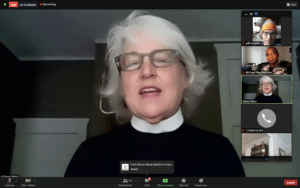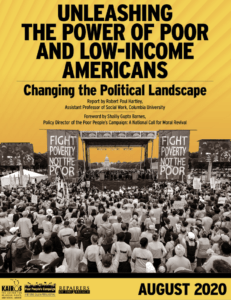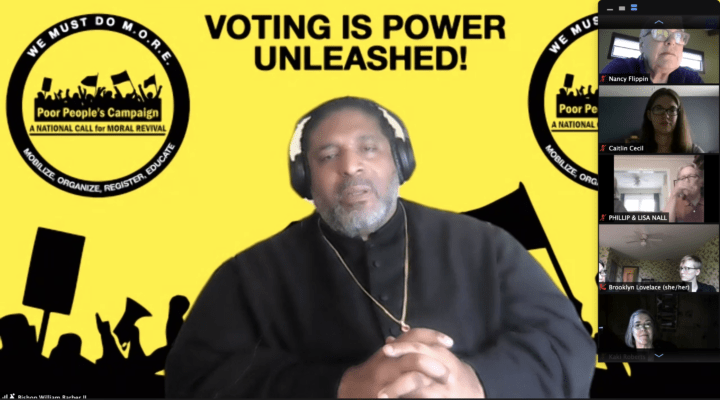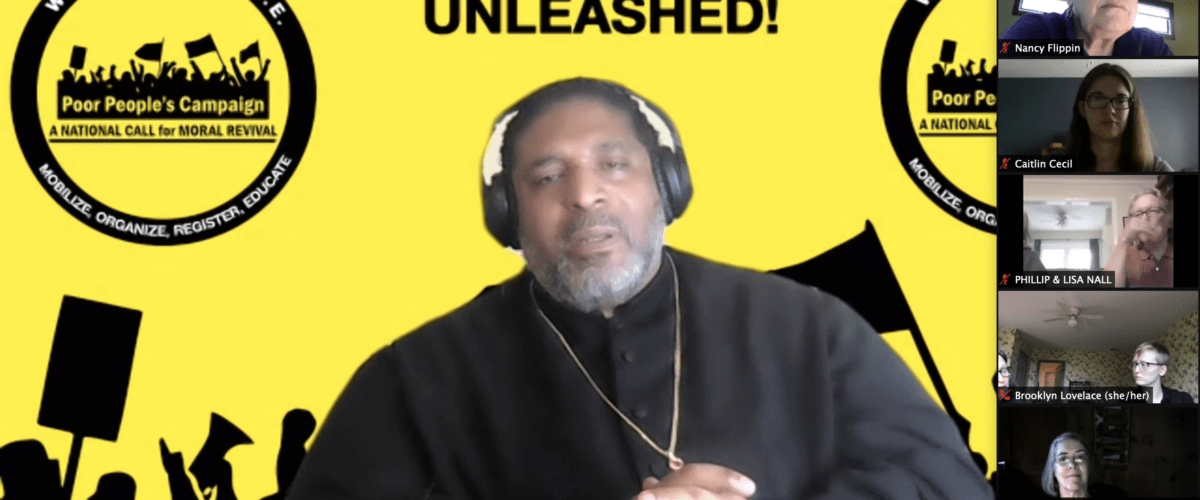Churches must help rally marginalized voters to reverse America’s political and moral decline, activist Bishop William J. Barber II said during the Alliance of Baptists’ online fall gathering Oct. 10.
“Galvanizing poor and low-income voters isn’t an act of charity, it is in fact what can save this democracy and our nation from falling further into crisis,” said Barber, co-chair of the Poor People’s Campaign and president and senior lecturer at Repairers of the Breach.
The North Carolina pastor and author is a powerful presence in the nation’s social and racial justice movements and a steady presence in pulpits and at civil disobedience gatherings.

Nancy Petty introduces William J. Barber II during the Alliance’s online fall meeting.
Nancy Petty, pastor at Pullen Memorial Baptist Church in Raleigh, N.C., introduced Barber as “my pastor, my friend, my jail mate and, I believe, this nation’s leading prophetic voice.”
In a nearly 50-minute address to members of the Alliance, Barber weaved between keynote address and fiery sermon. He fused polling data and biblical imagery to argue that disenfranchised voters — if registered, motivated and supported — have the numerical and prophetic standing to dramatically influence elections.
“Poor and low-wealth people hold the power … to transform elections from governors’ races to senate races to the White House,” he said.
People of faith must convince those oppressed by poverty and racism that they can exercise this influence at the ballot box, Barber said, but to do that, churches themselves must be reminded of their calling to seek justice and to have faith in the possibility of change they can help bring about.
“If we know who we are, we cannot shrink back now,” he said, referencing a verse from Hebrews 10 that punctuated his entire address. “Nothing would be more tragic than for us to turn back now.”
“The voice of God could be the vote of God. Voting is indeed power unleashed.”
There are divine connections between faith and voting, Barber said. He explained that rabbi friends have recently reminded him that the words for “voice” and “vote” are the same in Hebrew. “The voice of God could be the vote of God. Voting is indeed power unleashed.”
Conversely, voter suppression efforts are acts of “sin” because they deny the humanity and citizenship inherent in voter status, he said. “That suppression is suggesting that you are not a person. That suppression is saying that someone has the right to diminish the imago dei in all of us. Voter suppression is idolatry, is a form of political self-worship.”
‘It’s not the waking, it’s the rising’
This places voting, and even voter suppression, on a theological plane, he added. “The church cannot be quiet on that matter because to suppress our vote is political sin.”
“The only reason politicians seek to suppress the vote is because they know what we sometimes do not know: that we have the power.”
But there is a positive message to be taken from voter suppression efforts, Barber said. “The only reason politicians seek to suppress the vote is because they know what we sometimes do not know: that we have the power. They know we have the power. The question is, do we know?”
But knowing is not enough. It must be followed with action, he said. “It’s not the waking, it’s the rising.”
The rising includes the church’s involvement in educating, organizing, mobilizing and registering people for this movement, he said, declaring it is the role of prophetic movements “to break us free from all the false narratives that we have tended to give our allegiance to so we can have a deeper prophetic imagination.”
Engagement also includes perceiving violence as more than physical, he continued, citing Coretta Scott King, who said preventing access to education, suppressing wages, denying health care and robbing people of their culture are more common forms of violence than police brutality.
“And then she said: an apathetic attitude that refuses to address these other forms of violence also is, in itself, violence,” Barber said. “We can’t be among those who know something is wrong but don’t engage.
“Sometimes you can go to church and never hear a message about the poor, about the stranger, about the immigrant, about the homeless, even though that’s the dominant theme of Scripture. And yet, that’s where the power is.”
‘Stop believing the hype’
 The justice movement is also about numbers, Barber said, cautioning against despairing over voter surveys that feature only actual or likely voters.
The justice movement is also about numbers, Barber said, cautioning against despairing over voter surveys that feature only actual or likely voters.
Those polls often exclude people who cannot get off work to vote, do not have communities to help them register or get to polling places, and feel turned off because their issues are not discussed by parties and candidates, he said. “We have to be clear that the numbers we see are not the numbers that are possible.”
In search of the possible, the Poor People’s Campaign commissioned a study this year titled “Unleashing the Power of Poor and Low-Income Americans: Changing the Political Landscape.”
Reading from portions of the report, Barber said 100 million eligible voters did not participate in the 2016 general election, while only 29 million of 64 million poor and low-wealth voters cast ballots that year.
Given that Donald Trump won the presidency on Electoral College votes instead of the popular vote, it becomes clear that there were enough potential voters to change that outcome, he said.
But don’t blame the president, Barber said. “The worst thing you can do is say this is just about Trump.” The issues are much deeper, and the politically, economically and racially oppressed need allies to inspire them, he added.
“Stop believing the hype about the political races in our country. We need to organize people so our power can be unleashed.”


